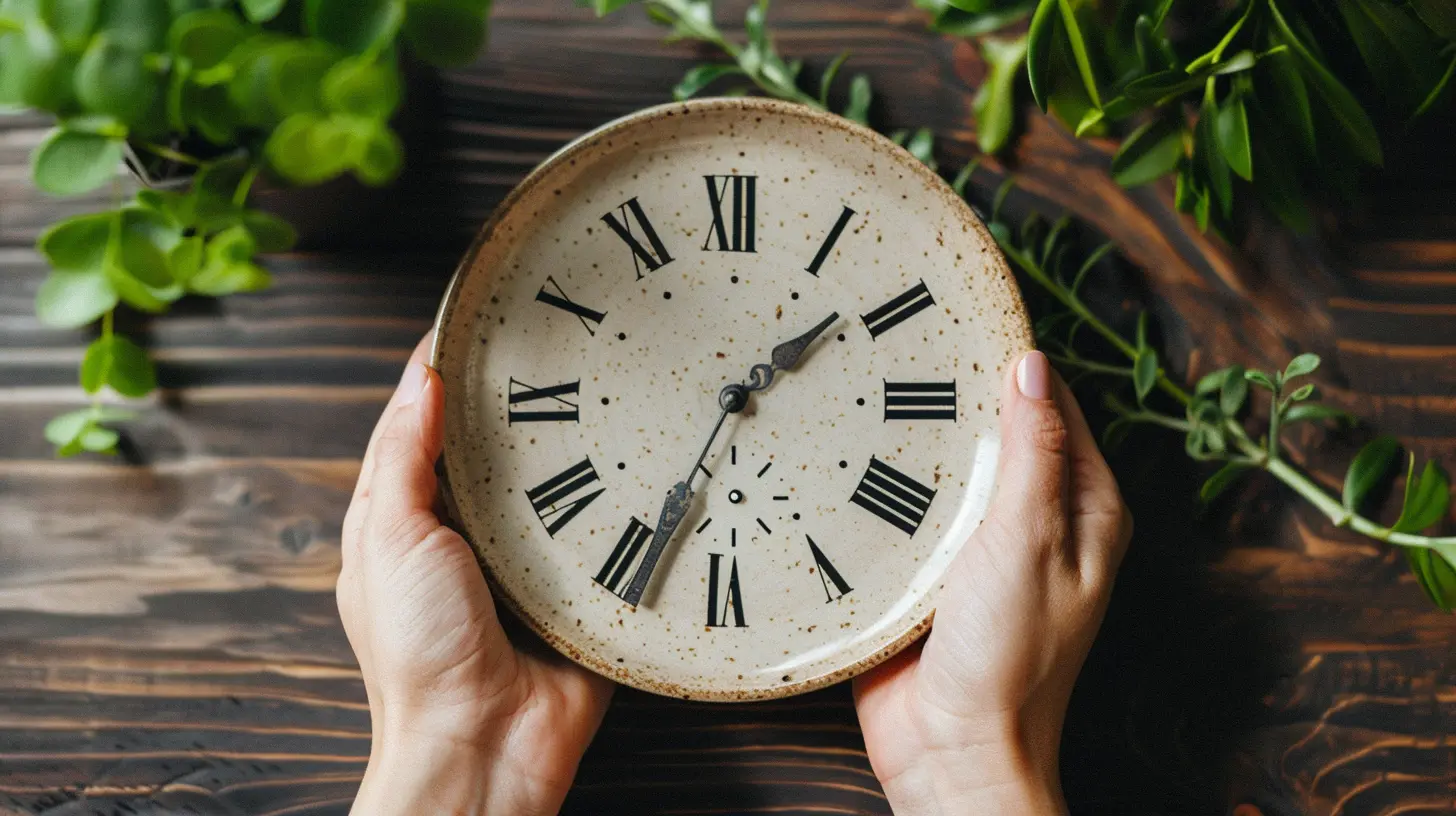Intermittent Fasting for Mental Health: Reducing Anxiety and Stress
18 July 2025
Alright, let’s be honest here. When most people hear “intermittent fasting,” they either roll their eyes so hard they risk dislocating their retinas, or they picture some intense, monk-like human subsisting only on dreams and herbal tea. But here’s the twist: intermittent fasting isn’t just some trendy, Instagram-worthy diet fad. Nope. It might actually be the secret weapon your brain has been begging for.
Get ready to push aside that third cup of coffee and those emergency chocolate cookies (yeah, we all have them) because what we’re about to dive into is how not eating—yes, skipping meals on purpose—could actually help reduce your anxiety and stress. Sounds absurd, right? But stick with me.

What Even Is Intermittent Fasting?
Let’s start simple. Intermittent fasting (IF, for the lazy typers among us) is not some medieval torture method. It’s just a pattern of eating that cycles between periods of eating and not eating. That’s it. No fancy kale spirals or quinoa smoothies required.Some popular IF methods include:
- 16:8 — Fast for 16 hours, eat during an 8-hour window
- 5:2 — Eat normally 5 days a week, then dramatically reduce calories (think 500-ish) 2 non-consecutive days
- OMAD (One Meal A Day) — Exactly what it sounds like: one epic meal. Like Thanksgiving dinner, but daily.
Now, while most people latch onto IF for weight loss or metabolic hacks, there’s this sneaky little benefit that not everyone talks about: it's got some serious perks for your mental health.

Wait, Skipping Breakfast Helps My Brain?
Yep. Counterintuitive? Definitely. But here's where it gets interesting.Your body is like that friend who throws a fit when plans change last minute (we all have one). Eating all the time—especially sugary, processed stuff—sends your body on a blood sugar rollercoaster, dragging your mood along for the ride. Ups and downs. Highs and crashes. Sound familiar?
Now, toss intermittent fasting into the mix, and suddenly you’ve interrupted that chaos. Fasting gives your body a breather. It's as if your brain finally gets a "do not disturb" sign. And guess what? That peace and quiet can reduce your anxiety and lower your stress.

But Seriously, How Does Not Eating Make Me Less Anxious?
I know it sounds like crazy talk. Isn’t being hangry a real thing? Absolutely! But hear me out.1. Bye-Bye Blood Sugar Freakouts
One huge mental health villain? Blood sugar spikes and crashes. They wreak havoc on your mood, energy, and brain clarity. One minute you’re dancing to your morning playlist, the next you're in a puddle of doom over a misdelivered Amazon package. Why? Sugar. It's not just your dentist’s nemesis.When you fast, your insulin levels stabilize. No more wild blood sugar swings. Fewer mood crashes. It’s like getting off the emotional treadmill and stepping into a calm, zen garden. Namaste, anyone?
2. Hello, Brain Chemicals
Fasting can boost brain-derived neurotrophic factor (BDNF). Don't worry if that sounds like mad scientist lingo. Just know BDNF is a big deal. It's like Miracle-Gro for your neurons. Higher BDNF levels = better mood, clearer thinking, and a friendlier brain space. Also, studies suggest BDNF may protect against depression and anxiety.Kind of makes skipping breakfast feel like a power move, huh?
3. Lower Cortisol – Your Not-So-Friendly Stress Hormone
We all know Cortisol. She’s the mean girl of your hormones. Stress? Cortisol. Sleepless nights? Cortisol. Crying over a TikTok that wasn’t even sad? You get the idea.Fasting can help regulate cortisol levels. That means less anxious buzzing in your brain and more calm, collected confidence. Like, the "I-got-this" version of you.

Can Fasting Actually Help Manage Anxiety Disorders?
Alright, let’s pause. We’re not saying IF is a magical cure for anxiety. You can’t just skip a few meals and expect to be transformed into a zen monk floating on mental peace. But, research and anecdotal evidence do suggest that intermittent fasting supports your brain in a way that makes dealing with anxiety just a little easier.Imagine your brain like a cluttered desktop (digitally or literally—no judgment). Fasting is kind of like closing all those 127 tabs open in your mental browser. Suddenly, things make more sense. You remember where you put your keys. You don’t snap at your boss. You breathe instead of panic. It’s not a cure, but dang, it makes a difference.
The Gut-Brain Connection: Your Second Brain's Starring Role
You’ve probably heard the phrase “gut feeling,” but here’s the zinger: your gut’s not just making you crave tacos, it’s actually a key player in your mental well-being.Enter the gut-brain axis, a fancy term for the direct line of communication between your digestive system and your brain. When your gut’s a mess—thanks to stress-eating, poor sleep, or battling that triple espresso addiction—your brain suffers.
Intermittent fasting gives your gut a break to repair and rebalance. It reduces inflammation, boosts good bacteria, and helps your microbiome (gut city!) thrive. And when the gut feels good, the brain throws a party—with fewer anxiety attacks and less mental fog.
But Will I Be Miserable While Fasting?
Let’s get real. If you go into intermittent fasting by just skipping meals with zero planning, yeah—you might feel like a grumpy bear.Here’s how to make it suck less:
Hydrate Like It's Your Job
Water, tea, black coffee—stay hydrated. Not drinking enough is like trying to clean your house without power. Nothing works right.Ease Into It
Don’t jump into a 24-hour fast unless you're into unnecessary suffering. Start with 12:12 (12 hours fasting, 12 hours eating), then work your way up. Like dipping your toe in cold water instead of cannonballing into the Arctic Ocean.Focus On Quality Foods
When you do eat, don’t binge on junk. Think of your eating window as a golden opportunity to fuel your body like a boss. Whole foods, veggies, good fats, lean proteins. Your brain will thank you.Don’t Ignore Your Body
Fasting shouldn't make you feel sick, dizzy, or decide that fighting a pigeon over a piece of bread is reasonable. If it’s too hard, pause. Your mental health matters more than nailing the perfect fast.Who Should Steer Clear of IF?
Spoiler alert: intermittent fasting isn’t for everyone (like, literally nothing is).If you’re:
- Pregnant or breastfeeding
- Managing a history of disordered eating
- Underweight
- A child or teen still growing
- On specific medications that require food
…then IF might not be your mental health miracle. Always check with a healthcare provider before jumping headfirst into a new lifestyle.
Anxiety, Meet Your Match (Sort Of)
Let’s be clear: intermittent fasting isn't going to solve all your problems. It won’t fix your toxic boss, ghosting Tinder dates, or the fact that your dog prefers your spouse.But it can help stabilize your mood, reduce anxiety triggers, and give your stress-ridden brain a break. It’s like decluttering your mental closet—less noise, more clarity, and maybe, just maybe, a little peace of mind.
Final Thoughts: Don’t Fear the Fast
Intermittent fasting is not some eat-less, feel-horrible strategy. It’s about being more intentional with when you fuel your body, and surprise—your brain loves structure and rest. It gets less distracted, freaks out less often, and may even make you want to return calls from your in-laws. (Okay, maybe not that good.)If you’re struggling with anxiety and stress—and let’s face it, who isn’t these days?—intermittent fasting might just become your unexpected new BFF. Give it a shot. Your brain might send you a thank-you note.
all images in this post were generated using AI tools
Category:
Intermittent FastingAuthor:

Eileen Wood
Discussion
rate this article
1 comments
Kingston Alvarez
Intermittent fasting powerfully enhances mental clarity and reduces stress.
August 6, 2025 at 4:51 PM

Eileen Wood
Thank you for your comment! Many studies support the idea that intermittent fasting can boost mental clarity and help reduce stress, making it a valuable tool for improving mental health.


